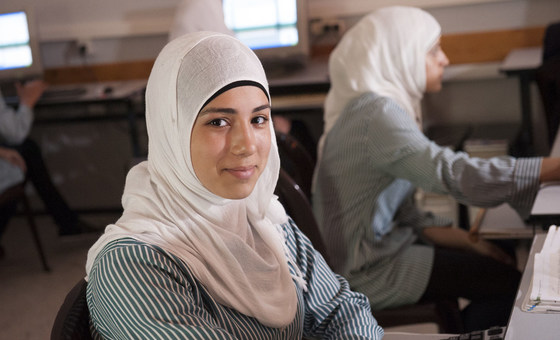
'Critical moment' for sustainable development, UN chief tells major financing forum
New York, Apr 16 (IBNS): “Uneven growth, rising debt levels, possible upticks in financial volatility, and heightened global trade tensions” are hampering progress on reaching the Sustainable Development Goals (SDGs), UN chief António Guterres told the Forum on Financing for Development on Monday, during what he called “a critical moment” to “accelerate action for sustainable development”.
Ministers, senior UN officials, high-level finance officials, civil society, business representatives and local authorities, are meeting at UN Headquarters for the four-day FfD Forum, as it is known for short.
Guterres said climate change, greenhouse gas emissions and technologies disrupting labour markets, were a major challenge, saying “We are here today as part of an effort to coordinate an urgent global response to reverse these trends”.
“Simply put,” he spelled out “we need more money to implement the Sustainable Development Goals”.
Noting that development aid remains essential, “especially for the poorest countries”, the UN chief shone a light on the importance of countries themselves generating more funding, including by increasing tax revenue and the impact of investment.
“National policy frameworks are key to reducing risks, creating an enabling business environment, incentivizing investment in public goals, and aligning financial systems with long-term sustainable development”, he stated.
‘Broad transformation’ needed
Inga Rhonda King, President of the Economic and Social Council (ECOSOC) opened the meeting by highlighting that while progress has been made, “we have not seen the broad transformation that we need, to achieve the SDGs by 2030”.
Pointing to economic and other risks, she homed in on “climate change, from the Caribbean to the Sahel”, which has actively reversed development gains; rising debt levels, which stifle investment in sustainable development; and increasing trade tensions dampening economic growth and inequalities within countries.
To address these risks, King stressed the need to: renew commitments to global multilateral cooperation; align financing frameworks to integrate the 2030 Agenda into national development strategies; and accelerate the financing of sustainable development.
“This Forum represents a critical milestone that sets the tone for the year ahead” she said.
Wanted: 600 million ‘decent jobs’
María Fernanda Espinosa, President of the General Assembly, noted that while global economic growth has remained steady, it was not enough just to support the 2030 Agenda.
She underscored the need to generate “600 million new decent jobs” up to 2030, which requires policies to take advantage of public and private SDG funding; mobilizing national resources by targeting tax policies, and more international tax cooperation to deal with tax evasion.
“A sustainable development future requires investing now, in the present”, she maintained. “Now it is time to act, to take decisive steps to make the promise to ‘free the human race from the tyranny of poverty’ a reality and contribute to make our Organization more relevant for all”.
‘A delicate moment’ for the economy
“The world economy right now is at a delicate moment”, said the Deputy Managing Director of the International Monetary Fund (IMF), Tao Zhang, echoing the outcome of the World Bank and IMF’s spring meetings in Washington last week.
While global expansion continues, he stated that it was at a slower pace than anticipated.
“We need to do better”, he spelled out, noting that stronger medium-term growth will be “essential for developing countries” to achieve the SDGs.
He detailed three “complimentary and reinforcing areas of policy action” to address this, namely, domestic policies to build resilience and promote inclusion; upgraded international cooperation; and the commitment to work together on broader global challenges.
Actions required today
From the World Bank, Mahmoud Mohieldin, Senior Vice President for the 2030 Development Agenda, UN Relations, and Partnerships, said that “business as usual, simply put, will not get us into ending extreme poverty by 2030”.
“There will be hundreds of millions of people will be suffering from extreme poverty by 2030 if business remains as we do it today”, with nine-out-of-ten of those affected, in Africa. “Actions are required today”, he exclaimed.
As an outcome of the spring meetings he said “we need bold and urgent reforms in development policies and financing” to achieve job growth opportunities and sustainability in the next decade.
Youthful demographics
Delivering a keynote address, Tharman Shanmugaratnam, Deputy Prime Minister of Singapore and Chair of the G20 Eminent Persons Group on Global Financial Governance highlighted the importance of mobilizing young people.
Noting that the size of the “youthful bulge” in our populations “vastly exceeds what we’ve seen before”, he said “the largest challenge” was that “we are not prepared to create the jobs required” for them.
We are ill-prepared by “every measure” of education, skills development and ability to provide young people with decent jobs”, he lamented.
Shanmugaratnam painted a picture of a failure to create jobs intersecting with other global challenges, such as climate change, loss of the world’s biodiversity and the spread of infectious disease, as having consequences that would surpass just economic costs.
Support Our Journalism
We cannot do without you.. your contribution supports unbiased journalism
IBNS is not driven by any ism- not wokeism, not racism, not skewed secularism, not hyper right-wing or left liberal ideals, nor by any hardline religious beliefs or hyper nationalism. We want to serve you good old objective news, as they are. We do not judge or preach. We let people decide for themselves. We only try to present factual and well-sourced news.







